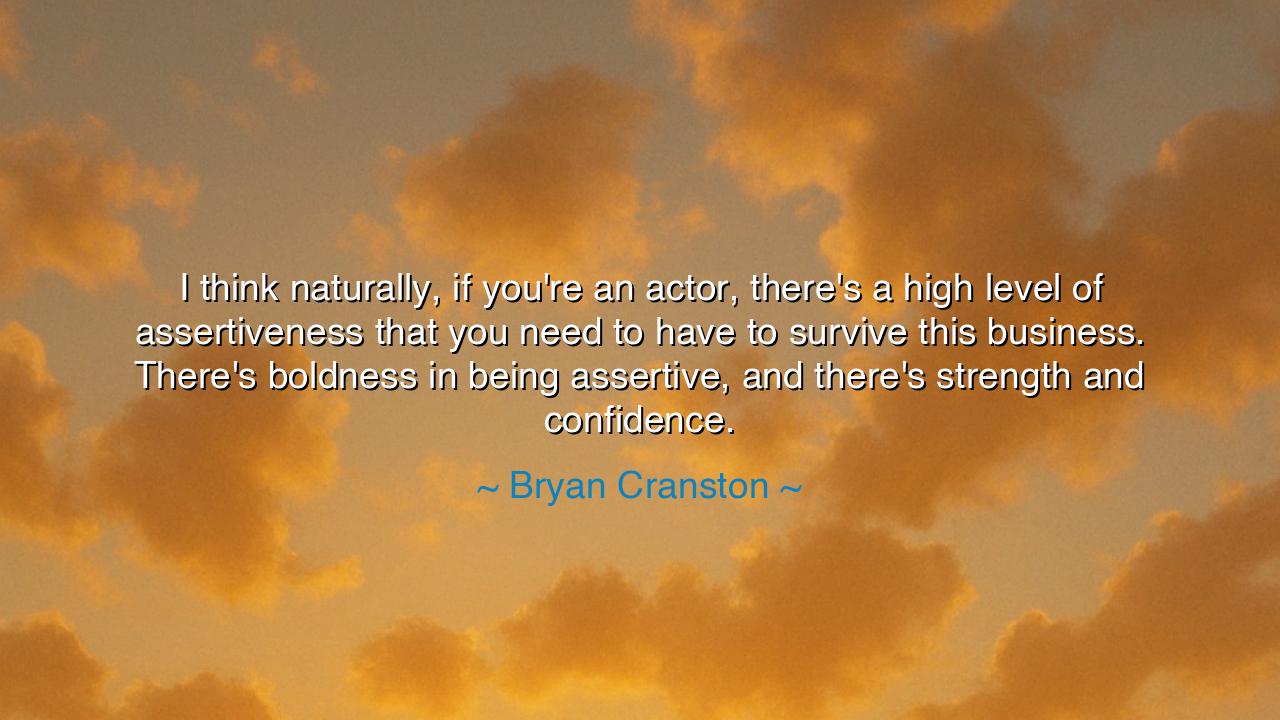
I think naturally, if you're an actor, there's a high level of
I think naturally, if you're an actor, there's a high level of assertiveness that you need to have to survive this business. There's boldness in being assertive, and there's strength and confidence.






Hear the words of Bryan Cranston, spoken with the weight of one who has endured the trials of his craft: “I think naturally, if you're an actor, there's a high level of assertiveness that you need to have to survive this business. There's boldness in being assertive, and there's strength and confidence.” These words are not only for the stage, nor for the world of actors alone, but for all who must contend with struggle and ambition. For life itself is a stage, filled with challenges and rivals, and only those who dare to step forward with assertiveness, with boldness, and with strength, can endure and triumph.
Cranston’s teaching arises from the harsh realities of his art. To be an actor is not merely to wear costumes or recite lines—it is to face rejection, to be tested again and again, to offer the heart before strangers and risk having it cast aside. In such a world, timidity is crushed. To survive, one must stand firm, speak clearly, and seize opportunity when it appears. This is the assertiveness of which he speaks: not arrogance, but the courage to claim one’s place, to say, “I belong here, and I will not be silenced.”
History has shown us countless figures who embody this truth. Think of Rosa Parks, who, though not on a stage of entertainment, stood on the stage of history. When she refused to give up her seat on that bus in Montgomery, it was boldness in being assertive. She did not shout, she did not rage, yet her quiet refusal shook an empire of injustice. Her strength and confidence sparked a movement that changed the destiny of a people. In this way, we see that Cranston’s wisdom reaches beyond art—it is a law of life: that the bold win space for the timid, and the confident clear paths for the fearful.
So too in the realm of invention. Thomas Edison, Henry Ford, and Steve Jobs—all bore the same trait. They faced ridicule, failure, rejection, yet they returned again and again with assertiveness, presenting their vision until the world could no longer ignore it. Had they lacked confidence, the lightbulb, the automobile, the personal computer might have remained dreams. Thus, it is not talent alone that brings success, but the willingness to stand, to speak, and to endure.
But let us beware: assertiveness is not the same as tyranny. The ancients warned that boldness without humility becomes pride, and pride invites destruction. Cranston’s wisdom is balanced—strength and confidence are to be carried not as weapons of domination, but as shields of endurance and voices of clarity. The true master of assertiveness uses it not to silence others, but to ensure he himself is not silenced.
Let this be the lesson for all: do not wait for opportunity to call upon you gently. Seek it. Stand tall when the moment arrives, and let your voice be steady. If you are passed over, return again. If you are rejected, rise once more. The business of life—whether in art, work, or love—belongs not to the hesitant, but to the bold who step forward with dignity.
Therefore, take action. Practice assertiveness in small things: speak when silence tempts you, stand firm when you are pressured to yield unjustly, claim your worth when others doubt it. Build within yourself strength and confidence, not as masks, but as foundations. Let your boldness open doors, and your persistence keep them open. In this way, you will not merely survive—you will flourish.
Thus is the teaching: Cranston’s words reveal that the actor, like the warrior, must be bold, assertive, and confident to endure. So too must you, in the theater of life. For the timid may fade into shadows, but the bold carve their names upon the stage of history, where they will be remembered.






AAdministratorAdministrator
Welcome, honored guests. Please leave a comment, we will respond soon